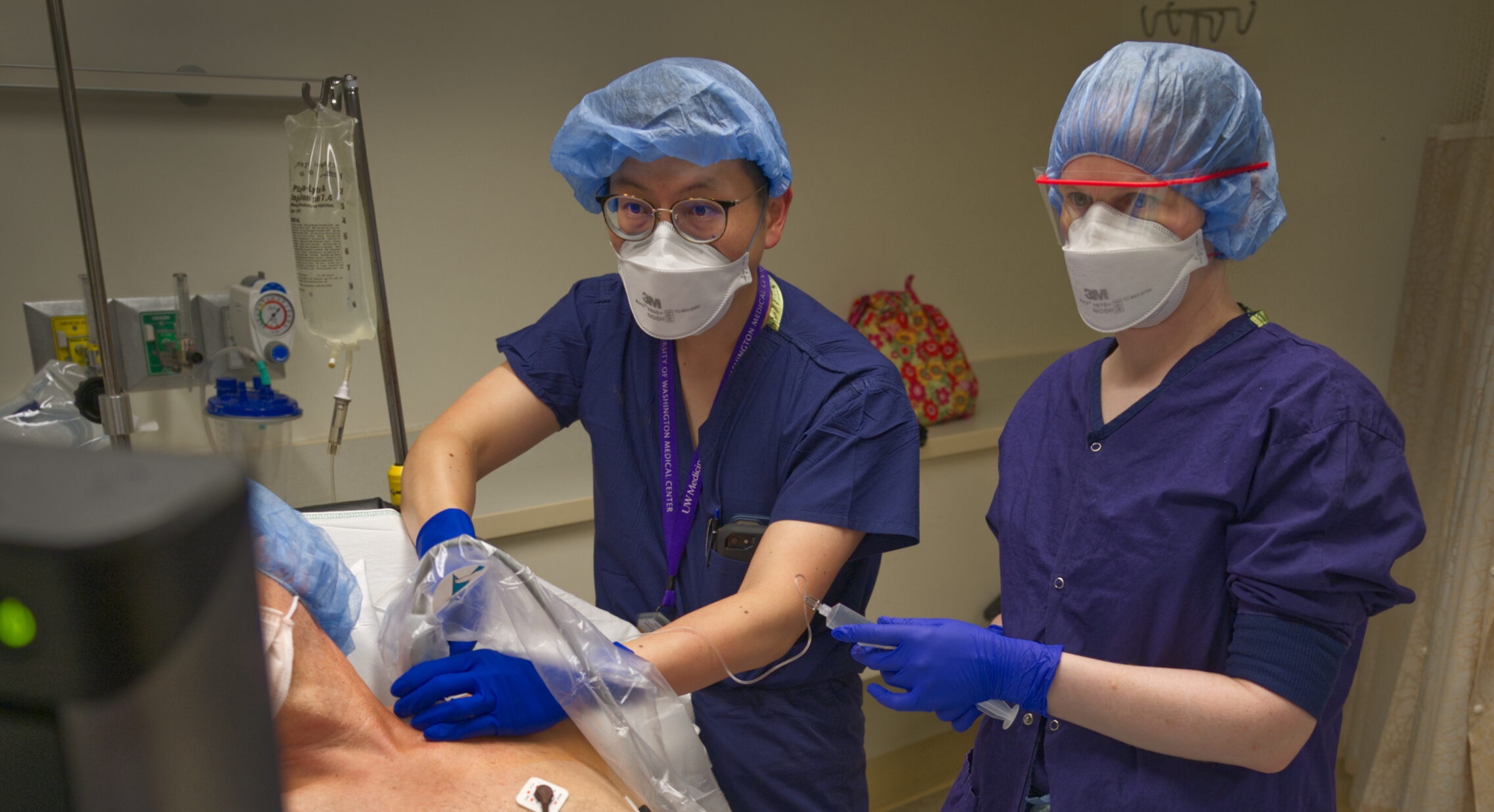About the Regional Anesthesiology Fellowship
The University of Washington offers a one-year fellowship in Regional Anesthesiology and Acute Pain Medicine. This fellowship offers an opportunity to provide regional and acute pain care at many of our hospital locations and satellite centers here in Seattle, including University of Washington Medical Center (UWMC)-Montlake, UWMC-Northwest, the Roosevelt Ambulatory Surgery Center and Harborview Medical Center. This is a post-graduate training subspecialty that is offered to trainees who have completed a three-year anesthesia residency training program in an accredited program in the U.S. or an equivalent international program. We have the flexibility to accommodate candidates with different areas and levels of interest. Our fellowship program graduates gain expertise in all aspects of regional anesthesia, learning up-to-date techniques for standard as well as recently described nerve blocks. Most of our techniques include the use of ultrasound guidance, and we are able to offer our patients in-patient and out-patient peripheral nerve catheters.
The objective of this fellowship is to provide the development of an expertise in clinical practice and the science of regional anesthesiology and acute pain medicine. We strive to educate our fellow trainees in the comprehensive perioperative management of patients receiving neuraxial or peripheral nerve blockade for anesthesia/analgesia. Upon successful completion of this one-year training, our fellows will be able to:
- Provide acute pain management for the full spectrum of surgeries, from trauma to oncologic to elective orthopedics; covering any condition that can lead to acute pain in a peri-operative setting
- Perform a comprehensive range of advanced regional anesthesia procedures for appropriate indications in a safe and effective manner, understanding the risks and benefits, and being able successfully communicate these with the patients
- Act as an expert consultant to other anesthesiologists, surgeons, nurses and other medical providers
- Have the ability to organize a regional service within a hospital or clinic setting in their future practice setting
- Feel comfortable integrating new technologies or new techniques into future practice
- Apply evidence-based-medicine, as it pertains to regional anesthesia, to make clinical decisions
- Translate a true comprehension of regional anesthesia into the ability to teach others the skills, techniques, communication styles, and the science behind regional anesthesia to trainees of all levels.
Our program allows regional fellows devote 60% of their efforts to academic activities related to regional anesthesia, including learning advanced regional anesthesia techniques from our faculty experts, teaching and supervising residents, participating and teaching at our annual cadaver workshop, and performing clinical research. The remaining 40% will consist of working as an Acting Instructor in the Department of Anesthesiology and Pain Medicine (see below Clinical Experience)
Each UW site offers the fellow a diverse opportunity of patients and practice patterns. The regional training at each site will be tailored to the patient and procedure needs. At UWMC-Montlake, the fellows’ educational objectives focus on mastering peripheral and neuraxial techniques, often for medically complex procedures. The training provides the management of basic and advanced regional anesthesia techniques for orthopedic oncologic procedures, upper extremity joint replacement, and general oncologic surgery, to name a few, teaching anesthesiology residents on their regional rotation, and coordinating the care of surgical patients who receive nerve block procedures as part of their clinical care. At UW HMC, the fellowship training will focus heavily on regional anesthesia for trauma patients as well as a very busy foot and ankle service. Fellows rotating at the free-standing outpatient surgery center, UWMC-Roosevelt, will learn to integrate regional anesthesia within the context of an efficient ambulatory surgery practice. And at our UWMC-NWH, regional for a busy lower extremity joint replacement service will provide plenty of opportunity to hone their skills on for elective surgeries. Fellows will also have the opportunity to join the Acute Pain Service team for a week at a time, to help manage patients requiring acute pain service care or consultation. There, they will learn to use pharmacologic and nonpharmacologic methods to treat pain and help with daily management of patients with peripheral nerve catheters and epidurals on the hospital wards.
Education
Fellows have didactic teaching and scheduled workshop teachings throughout the year, including a cadaver lab dedicated to learning regional anesthesia. Fellows are also given ample opportunity to participate in QI and research projects with dedicated time to these scholarly pursuits. Previous fellows have presented their projects at our annual Academic Evening, or at national meetings such as ASRA and ASA under the mentorship of UW faculty.
Clinical Experience
The clinical activities undertaken by the regional fellow consist of 40% effort working as an Acting Instructor in the Department of Anesthesiology and Pain Medicine, including clinical OR work and three 12-hour in-house OR call sessions per month.
Training in Seattle
Learn about life and training in Seattle. Visit our GME’s website for Prospective Residents and Fellows.
Compensation: The UW Regional Anesthesiology Fellowship is based on the UW GME schedule and may change from year to year.
Academic Allowance: Subject to available funding, fellows will receive an academic allowance each academic year as “all inclusive” support for their general expenses incurred during their time training.
Moonlighting Opportunities: Internal extra clinical shifts above and beyond fellowship commitment may be approved at the discretion of the program director for eligible fellows.
Program Director: Vanessa J. Loland, MD
Program Operations Specialist | Fellowship Program Administrator: Ruby Tang
Interested applicants must submit the following documents in order to apply:
- Current Curriculum Vitae
- Application for Faculty Fellowship (PDF)
- Letter of intent/personal statement
- Three current reference letters, including one from the residency program director or current director
- Copy of medical school diploma
- Copy of anesthesia degree (if applicable)
- Current medical license
- USMLE all three steps
- ECFMG documentation
- Documentation supporting citizenship status (if applicable)
We accept applications for the faculty fellowship program on an ongoing basis for positions beginning in Fall of each year. Preference will be given to applicants for two-year positions.
